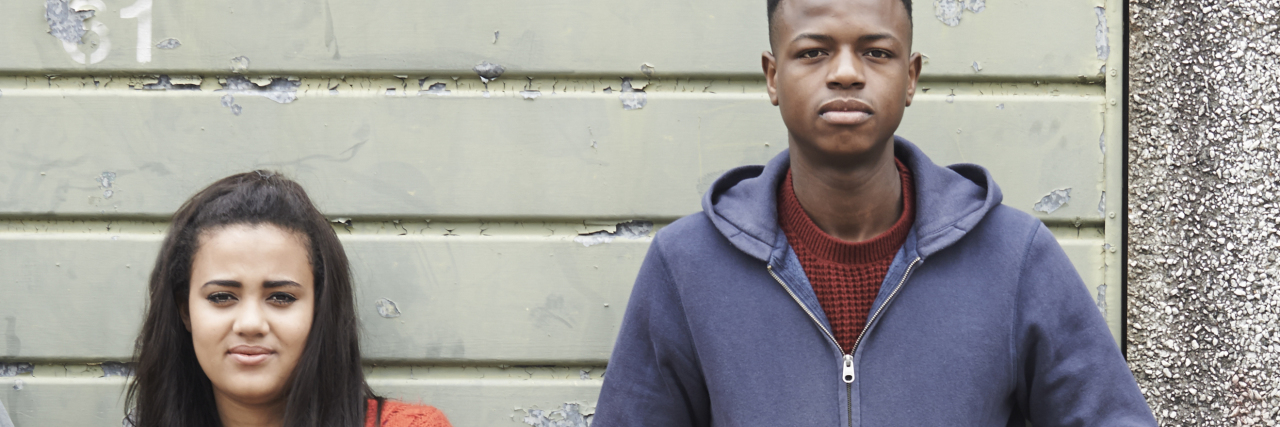We Need to Acknowledge the Barriers African-Americans Face When Seeking Mental Health Care
Authors note: I hold a master’s degree in addiction counseling and strive to uphold mental health in every facet of the word. Personally, I have epilepsy, anxiety and depression. I strive to help minority groups, those below the poverty line and immigrants who would not otherwise have access to mental healthcare.
I was first inspired to write this article in wake of the Black Lives Matter movement. During my studies in multicultural counseling, I saw the disparities of those with ethnic backgrounds and how those of color and immigrants were not afforded the same mental health opportunities as those who have insurance, those who live in the suburbs and those who live above the poverty line.
Depression is a scourge that is prevalent in the African-American community. According to the Health and Human Services Office of Minority Health, African-Americans are 10 percent more likely than the general population to experience serious mental health problems. Although anyone can develop a mental health problem, African-Americans often experience more severe forms of mental health conditions because of unmet needs and other barriers.
Depression can be prompted by many things: problematic thought and behavioral patterns, stress or general despair. It can also be triggered by institutional racism and poverty. Studies have revealed that the painful effects of racism may trigger not only short-term sadness or anger among African-Americans, but also deep bouts of depression, anxiety and other serious mental health issues that tear at the very fabric of the black community.
With racial tensions at an all-time high in America, black community members are likely to struggle with “battle fatigue” as they combat persistent stereotypes, institutionalized racism, discrimination, microaggressions, a lack of empathy and other social ills that are imposed upon them. All of these factors can have a detrimental impact on mental health. Even perceived maltreatment has been associated with adverse psychological and physiological consequences.
Another disturbing trend is economic disparities. African-Americans are disproportionately affected by poverty. People experiencing homelessness and exposure to violence are at a greater risk of developing mental health conditions. According to the 2012 U.S. Census Bureau American Community Survey, the poverty rate for all African Americans was 28.1 percent. This concentrated poverty often extends out the door of a family’s home and can occupy the entire neighborhood. Consequently, many African-Americans are forced to live in blighted communities where they might not feel safe in their own neighborhoods, let alone their homes. A family’s home is supposed to be a safe haven where they can take refuge from the ever-present hostilities of this world. Yet, for many African-Americans, the lack of a domestic sanctuary can trigger and exacerbate depression and anxiety.
Constant stress, anxiety and violence is often accompanied by post-traumatic stress disorder (PTSD). While the rate of PTSD is the same for African-Americans and Caucasians, it is often misdiagnosed in African-Americans and may be more difficult to assess because of emotionally blunted presentation (avoidance and numbness).
Socioeconomic factors play a vital role in African-Americans’ ability to treat their depression. Many are subjected to tenuous, low-paying, high-stress jobs, which can make it difficult to afford a co-pay or to take time off work. This is an undue burden and a substantial barrier for an African-American person wanting to seek treatment for their mental illness. In fact, this often makes it worse, feeding a vicious cycle.
Despite these alarming statistics and because of racial stereotypes and stigmas surrounding mental illness, many African-Americans continue to struggle in silence. They might not want to be perceived as weak or accused of “airing their dirty laundry” in public. Therefore, rather than seek medical treatment for mental health disorders, African-Americans often turn to their faith and prayer. One study also revealed that African-Americans who knew they struggled with depression preferred to “handle it” themselves, while a smaller percentage sought help only from family and close friends.
In addition to mental illness being a taboo topic in the black community, mental health providers can be insensitive to the cultural experiences and needs of African-Americans. It is important for mental health professionals to keep in mind the pressures and cultural differences of African-American clients, as well as clients of other races. Establishing boundaries and knowing the proper limits is crucial when counseling patients of color. Most importantly, it is vital to provide communities of color with quality mental health care services and properly diagnose the mental health problems their communities may face.
While I think it is unwise not to seek treatment, it is even more disheartening to know that disproportionate barriers impede African-Americans’ access to mental health services. In order to encourage African-Americans to seek treatment for depression, mental health professionals should be ready, willing, able and available to serve lower income clients. Access to effective mental healthcare is paramount to promoting social justice and equality. Effectively diagnosing and treating depression and other mental illnesses among African-Americans can provide immeasurable benefits not only to their community in particular, but to our society in general. Black mental health matters, too!
This piece was originally published in “Why Black Lives Matter (Too)“
If you or someone you know needs help, visit our suicide prevention resources page.
If you need support right now, call the National Suicide Prevention Lifeline at 1-800-273-8255, the Trevor Project at 1-866-488-7386 or reach the Crisis Text Line by texting “START” to 741741.
Getty image via Highwaystarz-Photography

